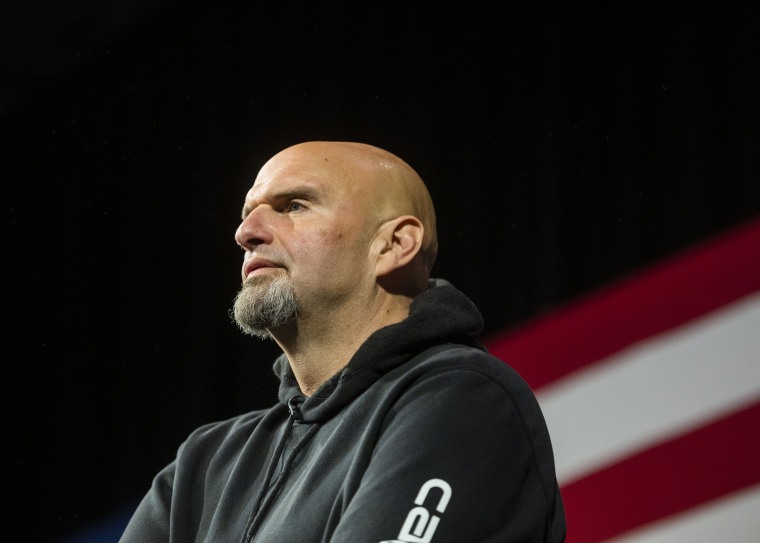WASHINGTON — In focus groups in Pennsylvania this week, swing voters were shown video of Senate Democratic nominee John Fetterman speaking at successive events since his May stroke. The consensus, according to two people familiar with the responses given to Democratic operatives, was that persuadable voters believe Fetterman is fit to serve and getting sharper.
But the fact that Democrats are asking voters about Fetterman’s health suggests at least some lingering concern about whether it will affect a tightening race, even as the candidate consolidates his support among the party faithful, ramps up his public schedule and prepares for an Oct. 25 debate with Republican rival Mehmet Oz.
Four months after the stroke, Fetterman has not released his medical records. For much of the summer, as he recuperated, he made few public appearances. He agreed to a single debate showdown with Oz, who has trailed in the polls and has accused him of dodging more debates to hide any infirmity.
Fetterman has said that his main challenge is a lingering “auditory processing” problem, which means that he can have trouble — particularly in noisy settings — picking out which sounds to listen to.
Earlier this month, Sen. Pat Toomey, R-Pa., who is retiring after two terms and supports Oz, questioned whether the Democrat could function in the Senate.
“As someone who served in the United States Senate for almost 12 years now, I have a really good understanding of how the place works,” Toomey said Sept. 6. “If John Fetterman were elected to the Senate, and he’s not able to communicate effectively, if he’s not able to engage with the press, if he’s not able to engage with colleagues, he will not be able to do the job.”
Democrats say Oz is pursuing a risky strategy because Fetterman’s capability is increasingly evident at rallies, in campaign events with small groups and in one-on-one interactions. Beyond that, they say, voters are turned off by Oz — a doctor — attacking a stroke victim’s health, a conclusion supported by some of the focus group participants.
“I was with him Saturday in Scranton — he had 1,000 people! I’ve been at a lot of gatherings and rally-type settings for Senate races — there aren’t a lot of Senate races that get 1,000 people,” Sen. Bob Casey, D-Pa., said in an interview, praising Fetterman’s connection to voters. “That connection is very strong. The other side is trying to break that and they’re having real trouble because they don’t have that same connection. That’s what the race is about.”
There are plenty of pressing policy issues for Pennsylvania voters — from the state of the economy to abortion and crime. But Oz has made sure that Fetterman’s health problems remain a top topic of political conversation. Fetterman now has the chance to put those concerns to rest in a high-stakes campaign that could tip control of the Democratic-led Senate and determine the fate of President Joe Biden’s agenda.
“John is communicating effectively with the people of Pennsylvania and running one of the best Senate campaigns in the country,” said Fetterman adviser Rebecca Katz, a former Senate leadership aide. “We don’t need to speculate about whether he can be an effective leader in January, after he’s had four more months to recover. He’s effective right now.”
Two sitting senators, Ben Ray Luján, D-N.M., and Chris Van Hollen, D-Md., have had strokes this year and returned to work.
Brooke Hatfield, associate director of health care services at the American Speech-Language-Hearing Association, an advocacy group for professionals and scientists work in communication-assistance fields, likened auditory-processing challenges in stroke victims to “being dropped in a foreign country where you know the language but don’t speak it every day,” adding that the brain has to “work harder.”
But, she added, auditory-processing issues do not affect decision-making or problem-solving and noted that a senator would have staff and technology — such as the closed-captioning Fetterman uses now — to help.
“There are a lot of supports available for people with communication differences,” Hatfield said. “I can’t think of a reason that someone with communication challenges … wouldn’t be able to do the things that they need to do.”

Earlier this summer, Pennsylvania Democrats privately expressed concerns about Fetterman’s health and lack of transparency, but Fetterman seems to have eased their fears. The party has coalesced around a message: highlighting his recent crowd sizes, playing up his bond with voters and pointing to Oz’s New Jersey roots.
Still, the race appears to have closed in the Keystone State. In a recent CBS News poll, Fetterman led Oz by 52% to 47%. Fetterman led Oz by 49% to 44% in a Morning Call/Muhlenberg College poll released Thursday.
The CBS survey revealed Oz’s persistent vulnerabilities within the GOP. While independents split evenly between the two candidates with 49% for each candidate, 13% of Republicans said they would vote for Fetterman over Oz (compared to just 5% of Democrats who chose Oz over Fetterman).
Rep. Mike Kelly, R-Pa., lamented the ugly GOP nominating contest that drove down Oz’s image.
“There’s nobody beating Republicans up more than other Republicans in primaries,” he said, adding that Oz’s biggest problem is “probably the Republicans who say ‘I’m not sure that he’s a real Republican.’”
But operatives in both parties believe that the race has tightened in recent weeks because Republicans are coming home to Oz and that the fight is for traditional swing voters.
Oz spokeswoman Brittany Yanick said in an email that Fetterman’s weaknesses are resonating in the campaign’s internal polling.
“John Fetterman’s lead in the Senate race has evaporated because Dr. Oz is talking to voters — Republicans, Democrats, and Independents — who want to see a change from the failed policies of the past,” Yanick said. “John Fetterman this entire campaign has failed to be honest about two things: his health and his support for releasing convicted murderers back on the streets.”
The CBS poll, conducted Sept. 6-12, found that voters say 59% to 41% that Fetterman is in good enough health to serve in public office. Among independents, it was 55% to 45%.
That helps explain why Republicans have been split on how much to focus on Fetterman’s health. Much of their ad spending has focused on allegations that Fetterman, who served on a state parole board, is soft on crime and too far left on economic issues.
Aside from Toomey, national Republicans have shied away from direct claims that Fetterman lacks the facilities to be a senator, instead suggesting that he should be more transparent and pivoting to policy critiques.
“He’s got to come clean about his health,” Sen. Rick Scott, R-Fla., the chair of the Republican campaign arm, said when asked if Fetterman has what it takes to do the job. “And then he’s also got to come clean about his radical policies like wanting to release a third of the criminals in the state and legalize all the drugs.”
Democrats say Oz’s strategy has been risky because some voters find a doctor attacking a stroke victim unseemly — and because he has set the bar for Fetterman’s debate performance so low that it will be easy to clear.
State Rep. Malcolm Kenyatta, one of Fetterman’s rivals for the Democratic nomination who have since rallied around him, said in an interview, he believes Oz’s attacks on Fetterman’s health showed a “sliminess” that will turn off voters.
Kenyatta added that he’s been encouraged by what he’s seen and heard from Fetterman since he resumed campaigning.
“That was very scary for a lot of people,” Kenyatta said of the stroke. “And I think people are happy to see that he took the time that he needed to get back up to a place where he could keep up the type of robust schedule that he has kept up since he came back to the campaign trail.”
Andy Harkulich, chair of the Mercer County Democratic Party in western Pennsylvania, hosted Fetterman at a late August rally and said the lieutenant governor seemed to be recovering well.
“If he’s having any problems, it’s slight,” said Harkulich, who huddled with Fetterman backstage. “But if you want to talk about mental, I mean, still very sharp. Remembered stuff that we’ve talked about before. I think he’s fine.”
The question is whether her fellow Pennsylvanians will feel the same on Nov. 8.


